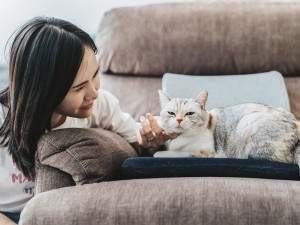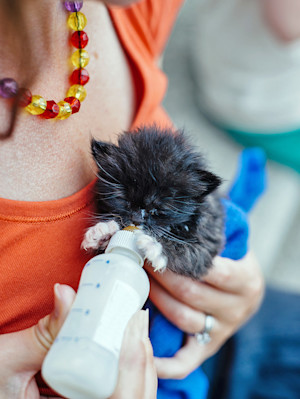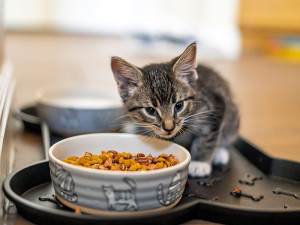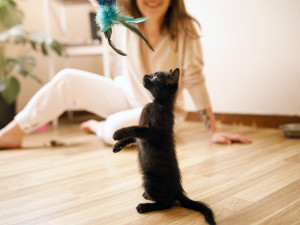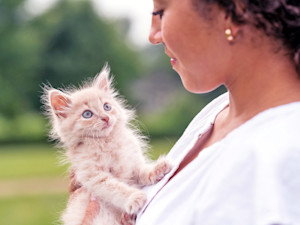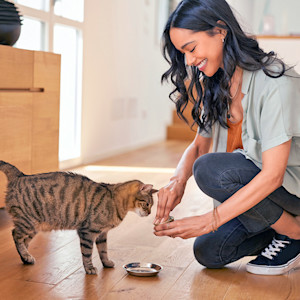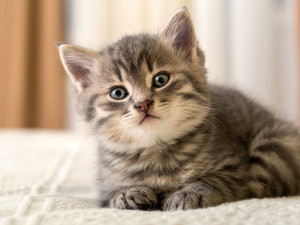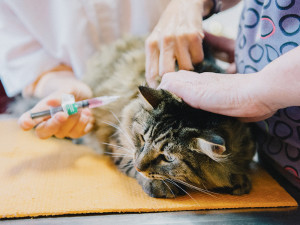Can You Overfeed a Kitten?
Guidelines from keeping them full — but not too full.

Share Article
In This Article:
Can You Overfeed a Kitten? How Do I Know If I’m Overfeeding My Kitten? Common Signs How Much Should I Feed My Kitten? Do Kittens Know When To Stop Eating? Frequently Asked Questions
While kittens require frequent meals and a nutrient-rich diet, it’s possible to overfeed them. Unfortunately, overfeeding can lead to obesity and related health issues. Proper portion control, a balanced diet, and an optimal feeding schedule are crucial for your kitten’s health.
Can you overfeed a kitten?
A kitten’s day revolves around three main activities: eating, sleeping, and engaging in play or snuggles. But can there be too much of a good thing for a kitten? When it comes to food, the answer is yes. Kittens grow at a break-neck speed and need lots of nutrients to support their growth. Despite their high nutritional demands, it is possible to overfeed a kitten.
There’s not a specific stage of kittenhood when you should worry about overfeeding your kitten, but some stages and situations are more prone to it. Kittens nursing from their mom are unlikely to overeat, but bottle-fed kittens can be given too much formula. Newly weaned kittens tend to pick at their kibble, while older kittens will give themselves little pot bellies full of food. After weaning, kittens can become excited about meal time and eat too much, making it the period when overeating is most likely to happen.

How do I know if I’m overfeeding my kitten? Common signs
Kittens require frequent meals and nutrient-dense food to thrive, but they shouldn’t overdo it. It’s natural for kitten parents to worry about whether their growing kitten is eating the right amount and wonder, “Am I overfeeding my kitten?”
Kittens should have a healthy appetite, and any change in their demeanor or digestion is cause for concern. While the following symptoms have some overlap with other health concerns, they may also be signs that a kitten is getting too much food:
Diarrhea
Abdominal distension
Decreased appetite
Straining to defecate
Vomiting
Lethargy
Consequences of overeating for kittens
Seeing a kitten eat themselves into a mini food coma seems cute, but constant overeating can have consequences, including:
Obesity
Obesity at a young age can set the stage for chronic health issues in cats. Overweight cats have a higher risk of developing diabetes. Obesity in kittenhood also puts extra weight and strain in developing joints. This can lead to conditions that cause pain and limit mobility, like arthritis or hip dysplasia. Extra weight can also put some young adult cats at higher risk of femoral capital physeal fractures, in which the femur bone breaks at the top, near the hip joint.
Diarrhea
A constantly over-full stomach in a kitten can result in malabsorption, meaning the body can’t effectively absorb all the nutrients in food. Malabsorption often leads to diarrhea, and the fluid loss from diarrhea can cause dehydration in a kitten.
Vomiting/Regurgitation
Stomachs stretch at each meal, but a kitten’s stomach can only stretch so far. When a kitten’s stomach is reaching capacity, additional food can lead to vomiting or regurgitation, putting the kitten at risk for aspiration (food going down the wrong tube) and pneumonia. Bottle babies have a higher risk for this.
Constipation
If a kitten is overeating dry kibble while not drinking enough water, they can become constipated. Because dry food contains significantly less moisture than wet food and digestion pulls out even more water, inadequate water intake can make it difficult for a kitten to pass stool. Trying to pass dry, hard poop can be painful and may require veterinary care, like enemas and fluids.
How much should I feed my kitten?
How much and how often kittens should eat depends on multiple factors, including age and body weight. There are precise methods to calculate how much a kitten should eat, but there's no need to break out a scientific calculator. Instead, kitten parents should choose a high-quality food and rely on the feeding guidelines provided on the packaging, along with their kitten's weight and veterinary guidance, to determine the appropriate daily amount. The number of meals the daily amount is broken down into will vary based on the kitten’s age and life stage.
Nursing kittens
Newborn kittens will nurse from their mom frequently (every two hours or so) and until they’re full. Orphaned kittens that are being bottle fed should also be fed every two to four hours. The amount that they should be fed depends on the specific milk-replacement product. Weight gain is the most important indicator that a newborn kitten is getting enough food. Kittens should gain about half an ounce of body weight per day.
Feeding weaning kittens
During the weaning process, which typically starts around three or four weeks of age, kittens will gradually transition from milk to solid food. At this stage, they can be free-fed or offered small, frequent meals — ideally four to six times a day. If offering wet food, determine how many cans a kitten needs to eat per day, and break that up into four to six meals. Because moistening dry kibble with water is recommended for weaning kittens, the daily allowance can be divided and refreshed during the day, instead of leaving kittens with 12-hour-old mush. Once kittens are weaned, their feedings can be reduced to three larger meals per day.
Feeding kittens six months and older
At six months of age, kittens can be transitioned to a twice-daily feeding schedule. Avoid free feeding kittens, as this can lead to overeating. Monitor for continued healthy growth. Depending on breed and gender, cats will reach their full adult size between 7 and 15 months of age.
Is my kitten overweight?
Ideal body condition in a cat includes a visible (but not drastic) narrowing of the waist and a slight upward tuck in the abdomen. Kittens should appear relatively lean without obvious excess fat. When petting your kitten, you should be able to easily feel the ribs, but not see them.
An overweight kitten will have a rounded body with an ill-defined waistline. Excess fat may start to make the abdomen appear to hang low and make the ribs more difficult to feel. Overweight kittens may also have less energy. If your cat is overweight, talk to your veterinarian to determine a feeding plan that supports your kitten’s growth and development, while correcting over-conditioning.
Do kittens know when to stop eating?
Kittens don’t always know when to stop eating, especially when food is readily available and very tasty. Kittens can develop an insatiable love for food early in life. Under around three months of age, most kittens self-regulate and do stop eating when full. However, after three to four months of age, self-regulation becomes less reliable.
At this stage, kittens should be meal fed with controlled portions. Many kittens will overeat if given unlimited access to food. This tendency to overeat can continue into adulthood, leading to struggles with body weight and weight-related health issues. Encouraging healthy eating patterns early in life will help keep your cat trim and fit as they progress through life.
FAQs (People also ask):
How much should you actually be feeding your cat?
The amount a cat should be fed depends on several factors, including age, weight, activity level, and the type of food offered. In general, kittens eat more frequently and consume a higher percentage of body weight in food.
When can kittens eat dry food?
Kittens can eat dry food when they’re about six weeks old, after all their baby teeth have come in. Kittens should first be offered dry kibble softened with warm water for several days. Less water can be added over time until the kitten can easily eat the kibble dry.
How many times a day should a kitten eat?
Nursing kittens need to eat every two to four hours. During weaning, they can be free-fed or given four to six meals daily. From four to six months, three meals per day is ideal. After six months, kittens can transition to a twice-daily feeding schedule.
References:

Dr. Alycia Washington, DVM, MS
Alycia Washington is a small-animal emergency veterinarian with over 10 years of experience based in North Carolina. She works as a relief veterinarianopens in new tab and provides services to numerous emergency and specialty hospitals. She also works as a veterinary writer with a focus on educating pet parents.
Related articles
![Woman playing with a black kitten.]()
5 Kitten Behavioral Milestones You Should Know
Keep track of all their fun phases with these guidelines.
![Woman holding her young kitten in her arms outside.]()
How to Determine a Kitten’s Age
There are a few factors to consider.
When Can a Kitten Leave Their Mom?
And why it’s important for their health to stay with her as long as possible.
![Woman feeding her kitten.]()
When Can a Kitten Eat Wet Food?
And how to know what kind they need.
![Kitten sitting on a blanket]()
7 Steps to Keep Your New Kitten Happy and Healthy
With great cuteness comes great responsibility. A vet breaks down everything you need to know when you bring home a new kitten.
![cat getting a vaccine at the vet]()
Yep, Kittens Need Vaccines (Even Indoor Ones)
A vet gets the facts straight.

